Our Mission
Our mission is to improve patient throughput by maximizing hospital operating room efficiencies in an open and fair way.

Our mission is to improve patient throughput by maximizing hospital operating room efficiencies in an open and fair way.
Pelorus Systems was created by an anesthesiologist to help hospitals improve operating room throughput. Large computer monitors are placed throughout the operating room to display room start and turnover times. By providing immediate feedback, Pelorus gives you the data you need to improve productivity in real time. The system encourages parallel processing and daily reports help you close the loop on chronic problems.
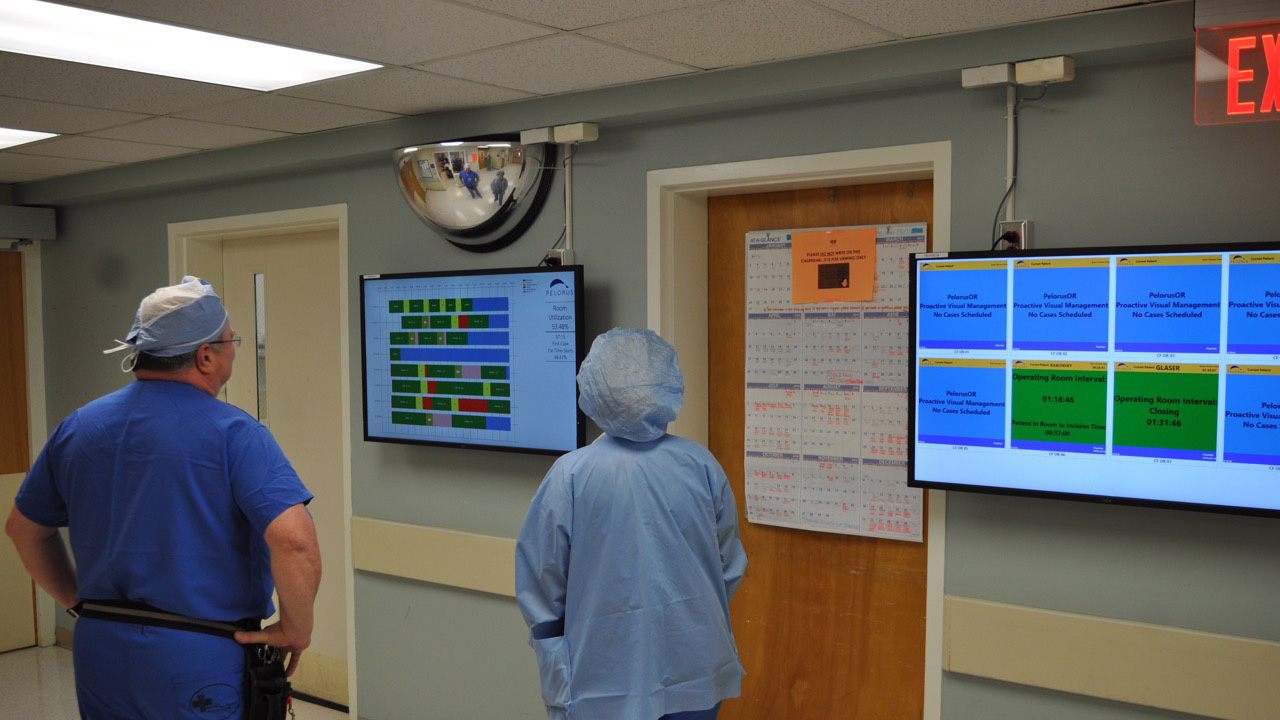
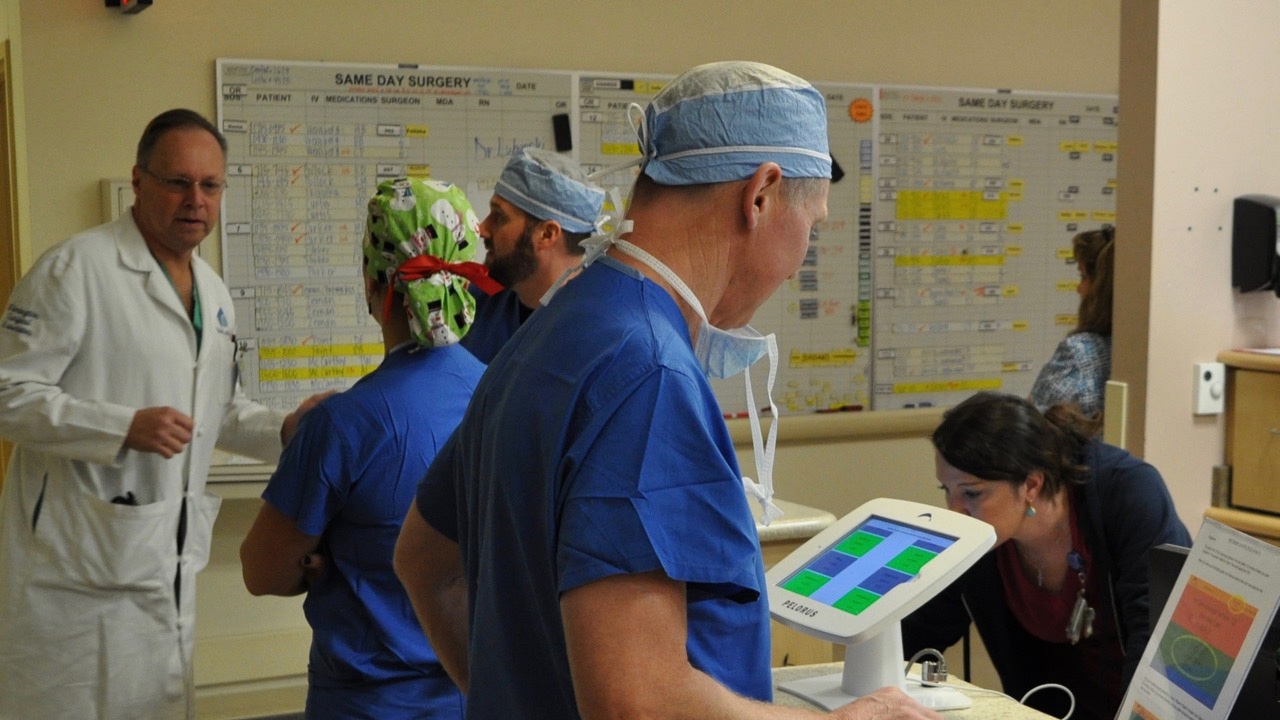
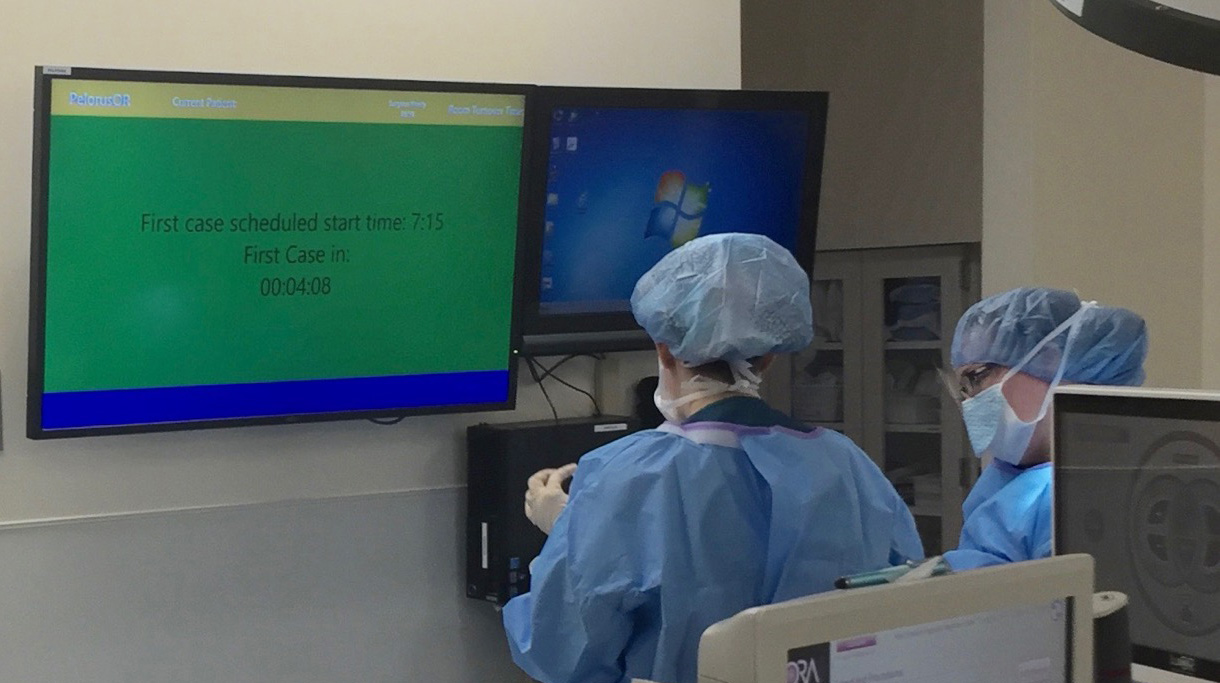
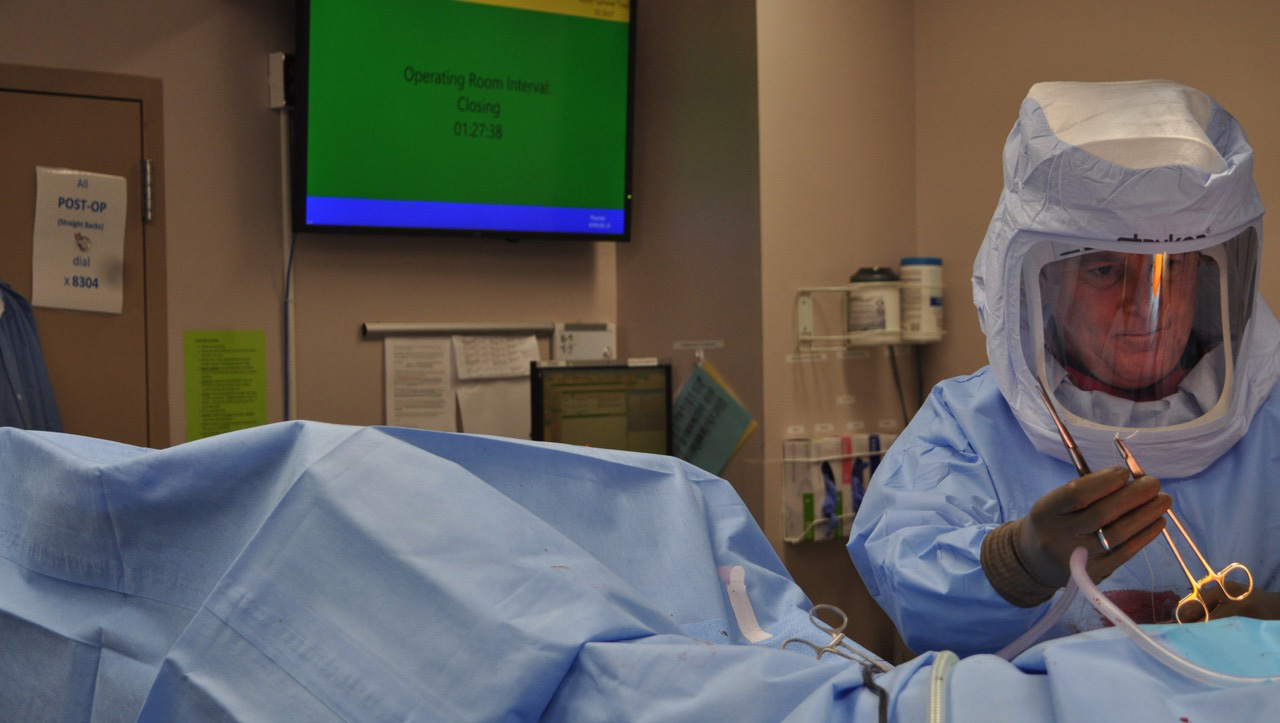

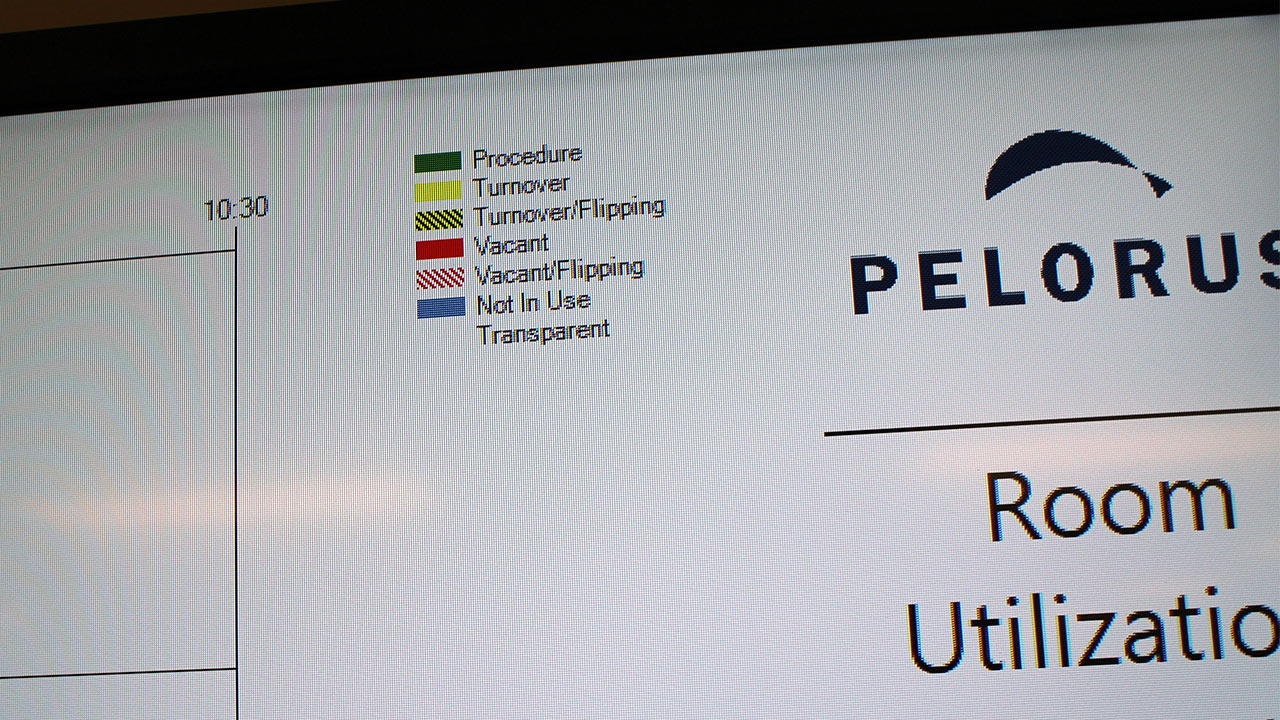
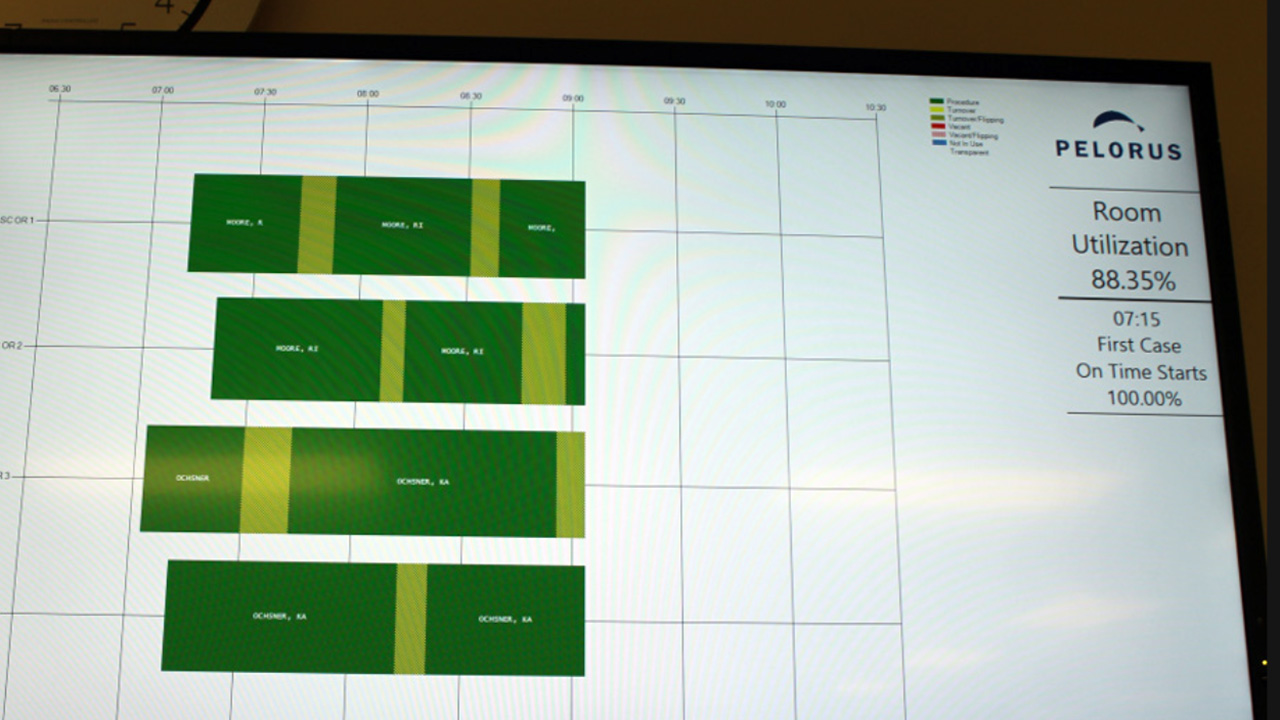
The Pelorus team will develop a standard one-way data feed out of your existing EMR and store the data in the Pelorus SQL database within your hospital's data center. This data drives large computer screens that are placed in each OR, staff lounge, surgeon lounge, and at the OR front desk. Your hospital technical team only needs to manage power, network connectivity and individualized device security. Following installation, the system will be maintained primarily by the Pelorus team.
Financial evaluation from hospital management points toward a return of investment of around six months. More importantly, the open reporting method ends the ageless OR argument regarding turnover time perception. The Pelorus team will offer suggestions to best utilize your visual data to maximize your OR schedule including daily review of delays and standardizing improvement strategies.
After twenty years of anesthesia practice involving efficiency related operating room management, the electronic medical record allowed Dr Dalton to engage programmer John Philips to bring to life the concept of real time OR visual management addressing late OR starts, turnover time delays, complicated computerized reports and other frustrating hospital inefficiencies. In June of 2016 Pelorus launched into it's first EPIC hospital and is now established in an ambulatory surgery center (4 ORs), an orthopedic specialty hospital (8 ORs) and a large multi-specialty trauma center (25 ORs).

has been a private practice anesthesiologist specializing in regional anesthesia for more than 20 years. He earned his undergraduate degree at Stanford University, and his medical degree at Duke University. While completing a surgical internship at Harvard's Massachusetts General Hospital, he became acutely aware of the inefficiencies that surgeons feel as they wait for their patients to be ready for surgery.
Dr. Dalton went on to complete his anesthesia residency at the University of Florida, and a fellowship in regional anesthesia at the Virginia Mason Clinic in Seattle, Washington. During this time, Dr Dalton began to study OR efficiency data which showed that regional anesthesia, when done outside of the operating room, often saves valuable time. Operating room metrics became his second passion, and he developed Pelorus Systems to offer hospitals solutions for better OR time management.

is a serial entrepreneur and has been delivering technological solutions to solve business problems for over 38 years. He started programming in early days of the personal computer, writing BASIC programs on his TRS-80 computer for his father's business, and later developing business applications on the first IBM PCs for a fast food franchisee during high school summers. He graduated from Duke University in 1987 with a degree in Electrical Engineering. Over his career, John has held various technical and management positions in telecommunications, internet, and healthcare technology companies. John has been on the founding leadership team of two venture backed startups, both of which were ultimately sold to public companies. John brings a unique mix of business acumen, technology understanding, and development skills to solving complex business problems.
This privacy policy has been compiled to better serve those who are concerned with how their 'Personally Identifiable Information' (PII) is being used online. PII, as described in US privacy law and information security, is information that can be used on its own or with other information to identify, contact, or locate a single person, or to identify an individual in context. Please read our privacy policy carefully to get a clear understanding of how we collect, use, protect or otherwise handle your Personally Identifiable Information in accordance with our website.
When ordering or registering on our site, as appropriate, you may be asked to enter your name, email address, phone number or other details to help you with your experience.
We collect information from you when you fill out a form or enter information on our site.
We may use the information we collect from you when you register, make a purchase, sign up for our newsletter, respond to a survey or marketing communication, surf the website, or use certain other site features in the following ways:
We do not use vulnerability scanning and/or scanning to PCI standards.
We only provide articles and information. We never ask for credit card numbers.
We do not use Malware Scanning.
We do not use an SSL certificate
We only provide articles and information. We never ask for personal or private information like names, email addresses, or credit card numbers.
We do not use cookies for tracking purposes
You can choose to have your computer warn you each time a cookie is being sent, or you can choose to turn off all cookies. You do this through your browser settings. Since browser is a little different, look at your browser's Help Menu to learn the correct way to modify your cookies.
If you turn cookies off, some features will be disabled. that make your site experience more efficient and may not function properly.
However, you will still be able to place orders.
We do not sell, trade, or otherwise transfer to outside parties your Personally Identifiable Information unless we provide users with advance notice. This does not include website hosting partners and other parties who assist us in operating our website, conducting our business, or serving our users, so long as those parties agree to keep this information confidential. We may also release information when it's release is appropriate to comply with the law, enforce our site policies, or protect ours or others' rights, property or safety.
However, non-personally identifiable visitor information may be provided to other parties for marketing, advertising, or other uses.
Occasionally, at our discretion, we may include or offer third-party products or services on our website. These third-party sites have separate and independent privacy policies. We therefore have no responsibility or liability for the content and activities of these linked sites. Nonetheless, we seek to protect the integrity of our site and welcome any feedback about these sites.
Google's advertising requirements can be summed up by Google's Advertising Principles. They are put in place to provide a positive experience for users. https://support.google.com/adwordspolicy/answer/1316548?hl=en
We use Google AdSense Advertising on our website.
Google, as a third-party vendor, uses cookies to serve ads on our site. Google's use of the DART cookie enables it to serve ads to our users based on previous visits to our site and other sites on the Internet. Users may opt-out of the use of the DART cookie by visiting the Google Ad and Content Network privacy policy.
We have implemented the following:
We, along with third-party vendors such as Google use first-party cookies (such as the Google Analytics cookies) and third-party cookies (such as the DoubleClick cookie) or other third-party identifiers together to compile data regarding user interactions with ad impressions and other ad service functions as they relate to our website.
Opting out:
Users can set preferences for how Google advertises to you using the Google Ad Settings page. Alternatively, you can opt out by visiting the Network Advertising Initiative Opt Out page or by using the Google Analytics Opt Out Browser add on.
CalOPPA is the first state law in the nation to require commercial websites and online services to post a privacy policy. The law's reach stretches well beyond California to require any person or company in the United States (and conceivably the world) that operates websites collecting Personally Identifiable Information from California consumers to post a conspicuous privacy policy on its website stating exactly the information being collected and those individuals or companies with whom it is being shared. - See more at: http://consumercal.org/california-online-privacy-protection-act-caloppa/#sthash.0FdRbT51.dpuf
According to CalOPPA, we agree to the following:
You will be notified of any Privacy Policy changes:
Can change your personal information:
We honor Do Not Track signals and Do Not Track, plant cookies, or use advertising when a Do Not Track (DNT) browser mechanism is in place.
It's also important to note that we do not allow third-party behavioral tracking
When it comes to the collection of personal information from children under the age of 13 years old, the Children's Online Privacy Protection Act (COPPA) puts parents in control. The Federal Trade Commission, United States' consumer protection agency, enforces the COPPA Rule, which spells out what operators of websites and online services must do to protect children's privacy and safety online.
We do not specifically market to children under the age of 13 years old.
The Fair Information Practices Principles form the backbone of privacy law in the United States and the concepts they include have played a significant role in the development of data protection laws around the globe. Understanding the Fair Information Practice Principles and how they should be implemented is critical to comply with the various privacy laws that protect personal information.
In order to be in line with Fair Information Practices we will take the following responsive action, should a data breach occur:
We will notify the users via in-site notification
We also agree to the Individual Redress Principle which requires that individuals have the right to legally pursue enforceable rights against data collectors and processors who fail to adhere to the law. This principle requires not only that individuals have enforceable rights against data users, but also that individuals have recourse to courts or government agencies to investigate and/or prosecute non-compliance by data processors.
The CAN-SPAM Act is a law that sets the rules for commercial email, establishes requirements for commercial messages, gives recipients the right to have emails stopped from being sent to them, and spells out tough penalties for violations.
We collect your email address in order to:
To be in accordance with CANSPAM, we agree to the following:
If at any time you would like to unsubscribe from receiving future emails, you can email us at info@pelorussystems.com and we will promptly remove you from ALL correspondence.
If there are any questions regarding this privacy policy, you may contact us using the information below.
http://pelorussystems.com/
1604 Harbour Drive
wilmington, North Carolina 28401
United States
info@pelorussystems.com
Last Edited on 2016-10-26